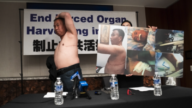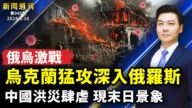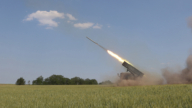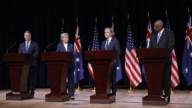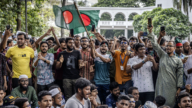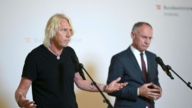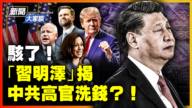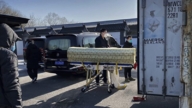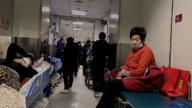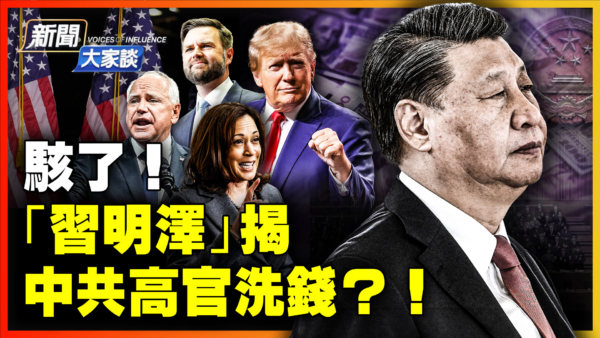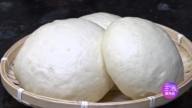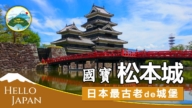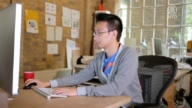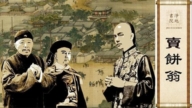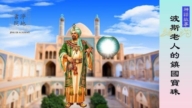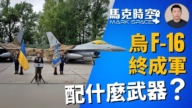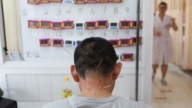【新唐人2015年01月07日訊】臺美斷交36年後,中華民國駐美代表處今年首度在雙橡園舉行元旦升旗典禮,此舉引起中共當局的強烈不滿。美國國務院表示,雙橡園日前舉行中華民國升旗典禮與美國政策不一致,但臺美關係沒有因此而改變。
2015年元旦,中華民國駐美代表處,於雙橡園(Twin Oaks)舉行升旗典禮,國旗由兩位駐美海軍軍官護送入場。
中華民國駐美代表瀋呂巡夫婦與代表處官員、僑務委員、僑界代表及退役將領等出席了儀式。
儀式由瀋呂巡主持,並在雙橡園主屋為軍事代表團4位國軍官員,頒授中華民國忠勤勳章,這也是軍事代表團成員在臺美斷交後,首度正式穿國軍制服出席雙橡園儀式。
對此,中共向美國提出「嚴正交涉」。1月5號,中共外交部發言人華春瑩說,中共「堅決反對」升旗儀式。
美國國務院發言人莎琪(Jen Psaki)回應指出,台灣在美升旗一事,不符合美國政策,美國事先對此並不知情,也沒有任何美方官員出席儀式。不過她也強調,臺美關係沒有因此而改變。
台灣國立政治大學國際關係研究中心主任嚴震生:「雙橡園有它的歷史像徵意義,在二次大戰前就由中華民國取得了,所以到現在為止有一個延續性,這個我相信是北京方面不太願意看到的。」
位於美國華盛頓特區的雙橡園在1937到1978年,一直是中華民國駐美大使官邸。1978年時任美國總統卡特無預警宣佈臺美斷交,雙橡園在斷交前夕,舉行最後一次降旗儀式。睽違36年,中華民國國旗再度飄揚美國華府。
台灣國立政治大學國際關係研究中心主任嚴震生表示,現在的雙橡園並非中華民國駐美代表的官邸,在這個地方舉行中華民國的升旗典禮,從北京的角度來看,這其中有美國的默許。
台灣國立政治大學國際關係研究中心主任嚴震生:「在這個地方升起國旗,如果沒有美國的默許,大概也不可能,所以中國大陸抗議的應該是為甚麼美國會默許的行為吧。當然,美國的默許會讓中共政府很不高興,但是這也是美國拿來制衡中國的一個手段。」
美國中文雜誌《中國事務》總編輯伍凡:「台灣跟美國現在發生微妙的變化,我想跟中國大陸有關,中國大陸現在軍事力量上來了,處處咄咄逼人,向外擴張,所以美國的政策就微調,還沒到正式承認一個中華民國,但是讓你把國旗升起來,表明一點意思就是跟你友好,下一步怎麼走,還要看整個局勢的變化。」
自從國民黨部隊1949年到台灣之後,中共和台灣一直分開統治。升旗儀式是最新一起涉及台灣、令中美關係緊張的事件。
中華民國駐美代表瀋呂巡在升旗儀式發佈的新聞稿中指出,忠愛自己國家的國旗是每個國家國民的神聖權利,也是普世人權的一部分,任何其他政治力量不應也不得打壓。
雖然自2008年以來,台灣和中共已經簽署一系列貿易和經濟協議,但是雙方政治和軍事的懷疑仍然存在,特別是在推崇民主的台灣,許多人害怕中共的真實意圖。
採訪/朱智善 編輯/黃億美 後製/郭敬
United States: ROC Flag-raising Doesn’t Mean Changes
in Taiwan-US Relations
ANCHOR:
36 years after Taiwan severed its diplomatic relations
with the U.S.,
Taiwan Representative Office in United States
(Taipei Economic and Cultural Representative Office, TECRO)
held its first national-flag-raising ceremony
at the Twin Oaks Estate on New Year’s Day.
It has aroused strong protest from the Chinese regime.
The US State Department said, “The ceremony is not consistent
with U.S. policy,"
and nothing has changed between Washington and Taipei.
On New Year’s Day 2015, the national flag was raised
at Twin Oaks.
The flag was escorted by two Taiwan naval officers
stationed in the United States.
Attending the ceremony were Taiwan’s Representative to the U.S.
Shen Lyu-shun and his wife, other TECRO officials,
board members of Taiwan’s Overseas Community Affairs Council,
representatives from the overseas Chinese community in the U.S.,
retired Taiwanese generals, etc.
Shen Lyu-shun presided over the flag-raising ceremony
and conferred upon four military personnel serving in the US
the Medal of Merit and the Order of Loyalty and Diligence
in the main hall of the Twin Oaks.
It was also the first time for military personnel
from Taiwan Military Mission to the US to attend a ceremony
at Twin Oaks Estate in military uniform
after the severance of diplomatic ties between the two countries.
In this regard, the Chinese regime lodged
“solemn representations" with the United States.
On January 5, Chinese Foreign Ministry spokeswoman
Hua Chunying said that the Chinese regime resolutely opposed
the flag-raising ceremony.
U.S. State Department spokeswoman Jen Psaki said
the ceremony “is not consistent with U.S. policy"
and that Washington did not know about it in advance.
She indicated that no U.S. officials attended the ceremony
and “nothing has changed as it relates to our relationship."
Yan Zhensheng, Director of the Research Center for Taiwan
International Relations of National Chengchi University:
“Twin Oaks Estate has its historical significance.
The Republic of China acquired it before World War II.
As it is symbolic of the continuity (of ROC),
I believe this is what Beijing doesn’t want to see."
Located in Washington, D.C., Twin Oaks Estate was
the residence of ROC ambassador to the U.S. from 1937 to 1978.
When the then US President Jimmy Carter abruptly announced
the severance of the ROC-US diplomatic ties in 1978.
The last flag-lowering ceremony was held at Twin Oaks
on the eve of the disconnection of the diplomatic relations.
Nearly 36 years later, the ROC flag was once again flying
in Washington D.C., the United States.
Yan Zhensheng expressed that now that the Twin Oaks
is no longer the residence of ROC ambassador to the U.S.,
from Beijing’s perspective, the U.S. might have given Taiwan
tacit consent to hold ROC flag-raising ceremony there,.
Yan Zhensheng: “Without U.S. consent, it’s not likely to hold
the flag-raising ceremony in that place.
So, the Chinese regime is protesting against the US act
of giving Taiwan tacit consent.
The Chinese regime, of course, would be unhappy
with the acquiescence,
but it’s also the US’s leverage over China."
Editor of American Chinese magazine China Affairs, Wu Fan:
“There have been subtle changes in the US-Taiwan relations
nowadays.
I think it has something to do with the Chinese regime.
Now that the Chinese regime is gaining more military prowess
and trying to expand its influence, the U.S. thus fine-tunes its policy.
Though it has not yet proceeded to the extent of formally
recognizing ROC, it allowed Taiwan to raise the national flag
to show its friendship.
As to the next step, it should be decided on the changes
of the overall situation."
Since the Kuomintang troops retreated to Taiwan in 1949,
China and Taiwan have been ruled separately.
The flag-raising ceremony was the latest Taiwan-related
incident that increased tension in Sino-US relations .
In the press release about the flag-raising ceremony,
Taiwan representative Shen Lyu-shun pointed out that
pledging allegiance to one’s own country’s national flag
is a sacred right of every national,
and it’s also part of universal human rights,
so it should not be suppressed by any other political forces.
Though Taiwan has signed a series of trade and economic
agreements with the Chinese regime since 2008,
there is still mistrust between the two sides
in the areas of politics and military.
In particular, many people in democratic Taiwan
are afraid of the Chinese regime’s motivations and intent
behind the scenes.
Interview/Zhu Zhishan Edit/Huang Yimei Post-Production/GuoJing



